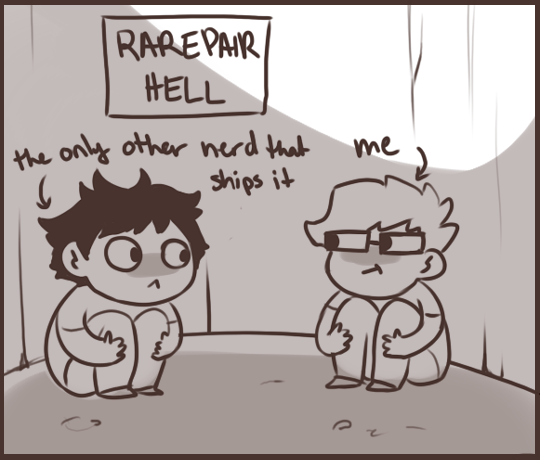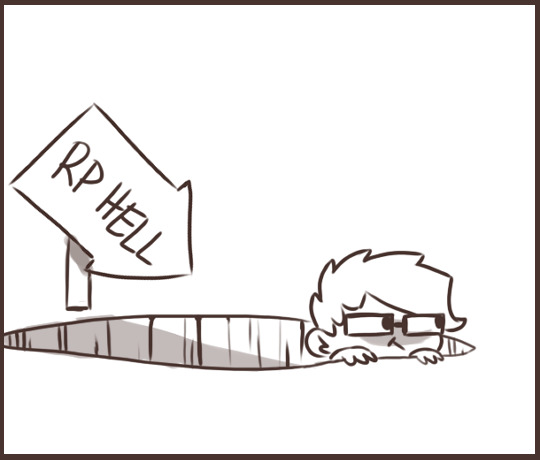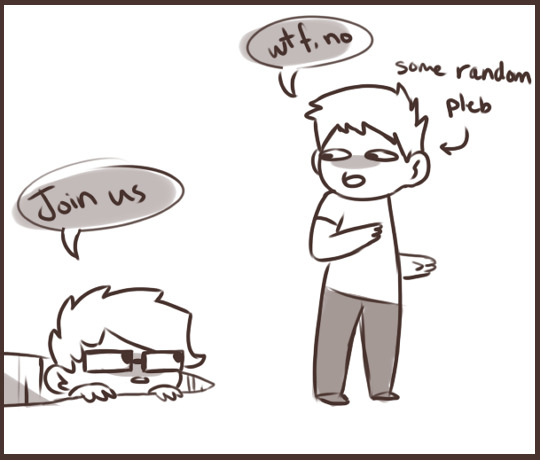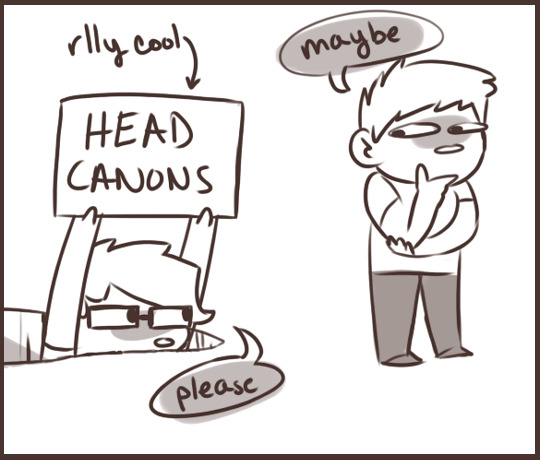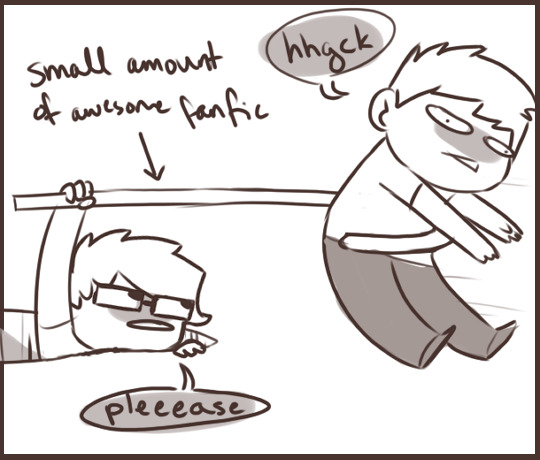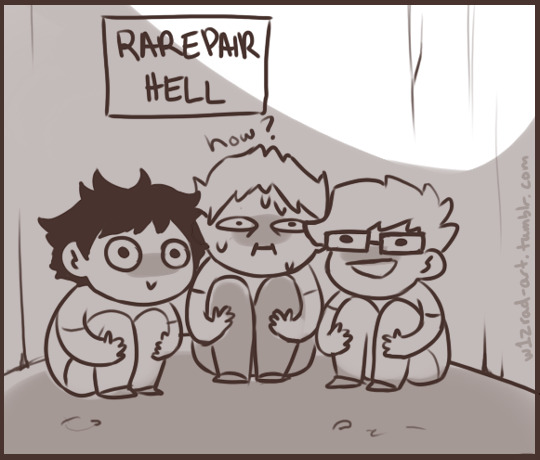Text

layout of the bamboo house from the scum villain donghua
963 notes
·
View notes
Text
One day, I doodled something.
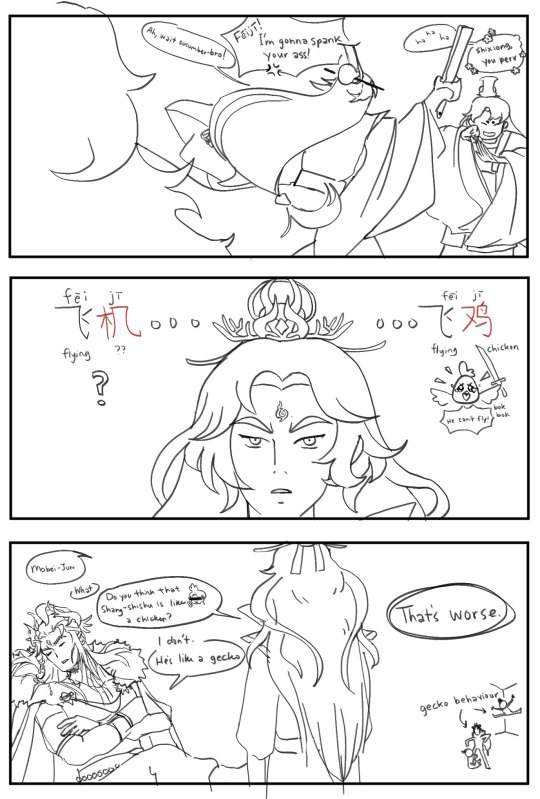
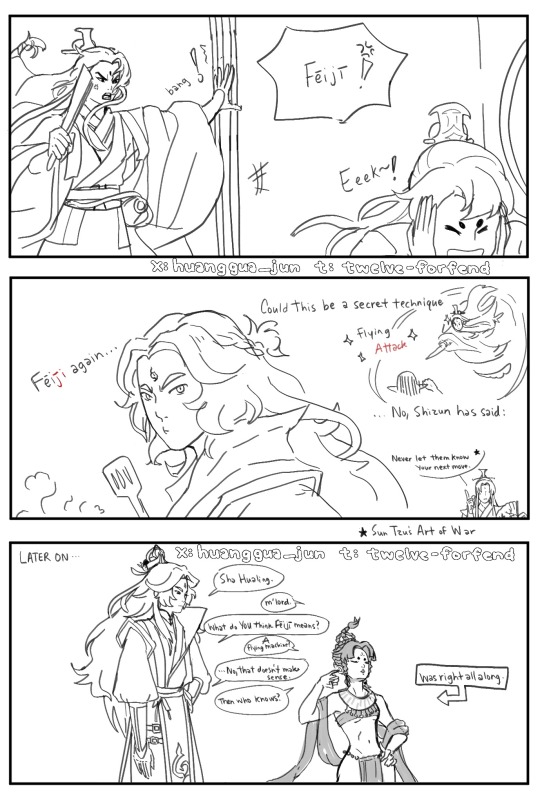
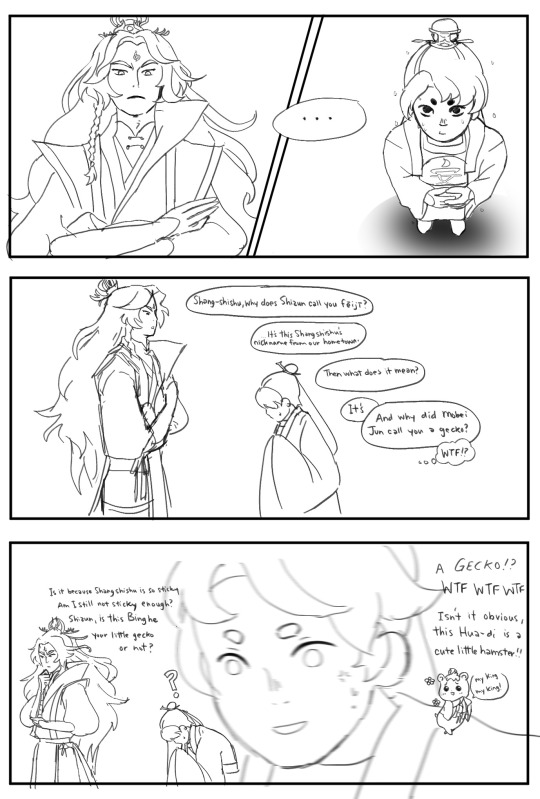
Why does Mobei Jun think of him as a gecko? Canon. Shang Qinghua is critter-coded.
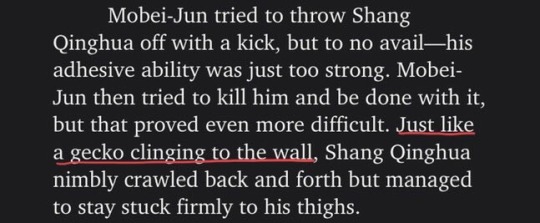
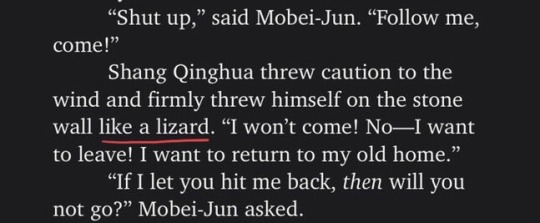
OG version in CN below:
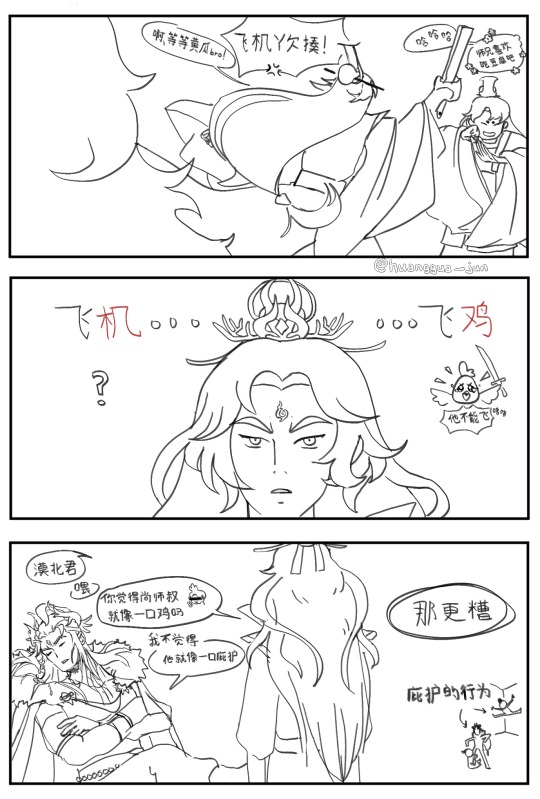
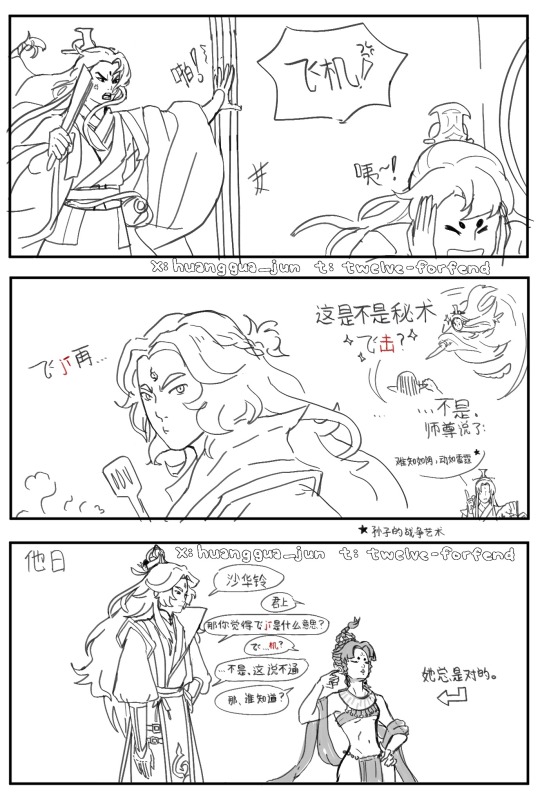
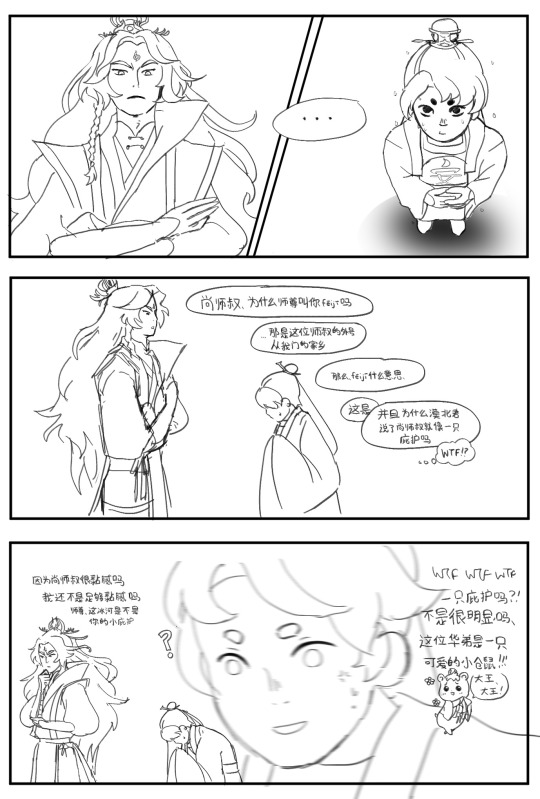
Disclaimer: I am still relearning Chinese. Sorry for any mistakes.
#svsss#luo binghe#shang qinghua#shen qingqiu#mobei jun#faynish's art#i'm still relearning how this website works
227 notes
·
View notes
Text
I am still working on a backlog of comms and turning them in one by one.
0 notes
Text
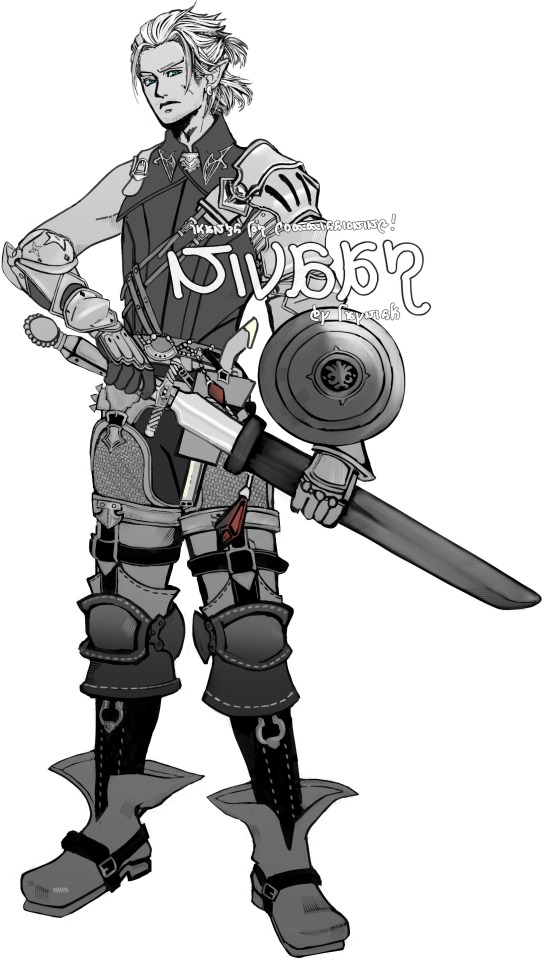
thanks to Lost-Shield for commissioning me!
4 notes
·
View notes
Text
Luo Binghe's Actual Age
While I was grabbing screenshots, I came across this part and had to pause. Shen Qingqiu asks how old Luo Binghe is, and Binghe replies: “弟子虚岁14” (This disciple is the nominal age of 14).
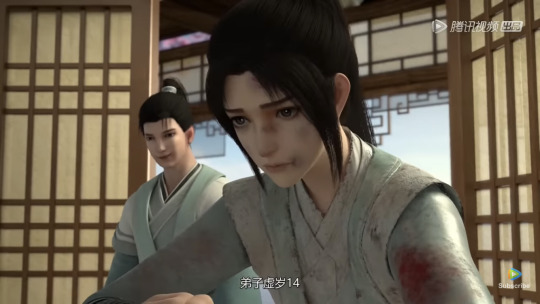
The NOMINAL age of 14?
I ran to the book to check and, sure enough, nominal age is specified there, too.
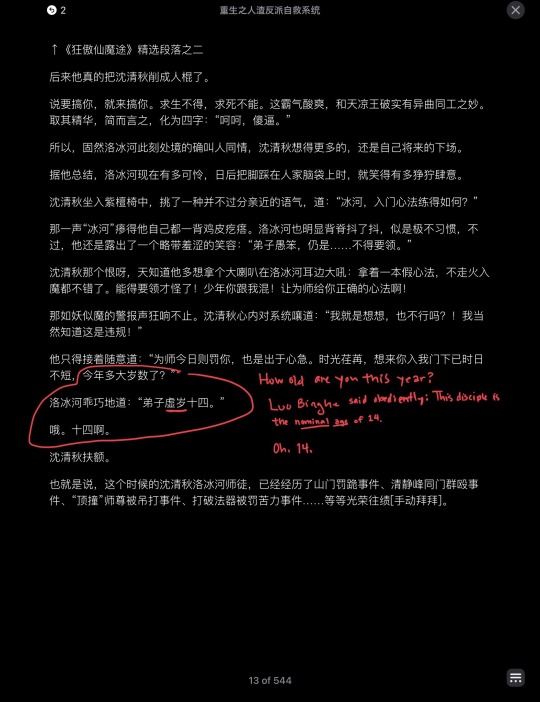
I had to lean back and stare at the wall in front of my desk for a moment. Why does this matter? Well, it doesn't — not really. But it puts some things into perspective.
You see, when counting the nominal age of a person, that person turns one year old the very moment they are born. And usually on the Lunar New Year (though some elders today insist that it happens on the winter solstice, which is today by the way — 冬至快乐🥟 ), everyone ages up another year together.
From the book, we know that Luo Binghe was born on the coldest (though not necessarily longest) night of the year. He could be a one-day old two year old. Or two month old two year old, if we count it by LNY and not Solstice. Either way, this CHILD is (to the West's age-counting system) two years younger than he announces using the NOMINAL age system.
Luo Binghe is twelve (not fourteen) when he meets Shen Yuan as Shen Qingqiu.
Luo Binghe is fifteen (not seventeen) when he's stabbed and pushed down into literal Hell and finds out he can regrow entire limbs.
Luo Binghe is sixteen (not eighteen) when he subjugates the Northern Kingdom and Sha Hualing's holdings under his rule.
Luo Binghe is seventeen (not nineteen) when he arrives at Huan Hua Palace.
And when he meets Shen Qingqiu again in Jin Lan just before the disaster at Hua Yue, he's eighteen (phew), not twenty.
That puts him at 23 (not 25) at Maigu Ridge.
He's still an adult when everything goes down, but no wonder Binghe is so messed up. He was so young!
728 notes
·
View notes
Text
Well, I did say this was a multi-fandom blog... Alright, let's do this.
The Qing Jing Peak Lord's Bamboo House
(and the symbolism therein, as recorded in the donghua)
I was snooping through the establishing shots of the Qing Jing Peak Lord's Bamboo House, and had to laugh as I always do at all the gay symbolism that managed to sneak its way inside. But then I looked a little closer, and was floored by just how much passive storytelling was packed into background assets. I talked about it at length over discord, and at the urging of others decided to make a shareable post on social media as well.
First, the shots which first piqued my interest in this topic years ago:
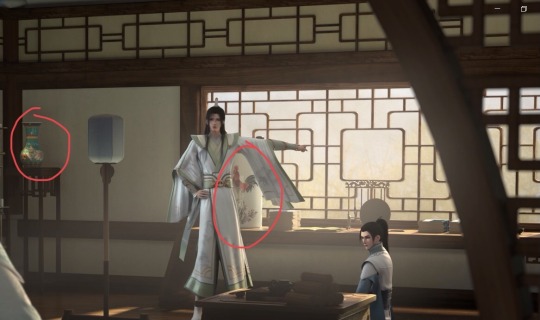
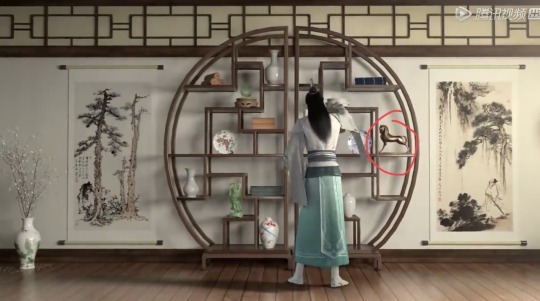
Shen Yuan transmigrates into the stallion-genre webnovel entitled 狂傲仙魔途 (translated as Proud Immortal Demon Way). The author's and his own usernames are dick jokes.
Notice the chrysanthemum vase, the cock vase, and the stallion statuette.
The stallion and cock are obvious nods to these jokes on their own, but for the uninitiated, the chrysanthemum is a symbol of gay sex between men, as the asshole itself is often euphemistically referred to as a chrysanthemum. This should have been Shen Yuan's first clue that not all is as it seems here! These are the personal quarters of Shen Jiu — the original Shen Qingqiu!
But let's move to the main room you first walk into upon entering the bamboo house.
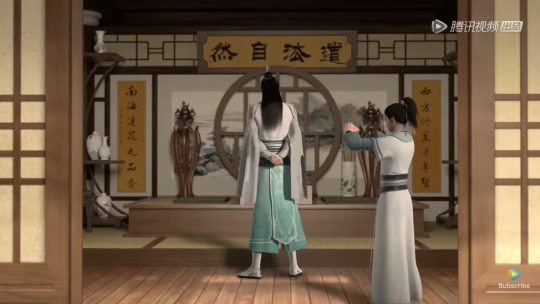
There it is: the writing on the wall.
As the Peak Lord of strategy and the scholarly arts, Shen Qingqiu would naturally have calligraphy and paintings hanging everywhere! So let's break it down.
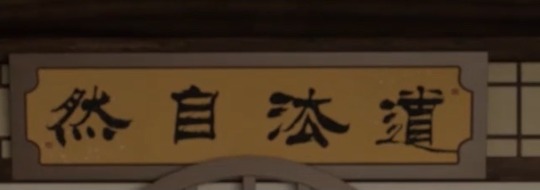
On the top we have 道㳒自然 ("Dao Follows Nature"), which comes from a Dao teaching by Laozi (founder of Daoism) meaning that life, death, the entire universe, the heavens and earth and everything outside and inbetween, all follow a set of laws referred to as the nature of things. Although unrelated to the Buddhist couplet below, it's certainly relevant!
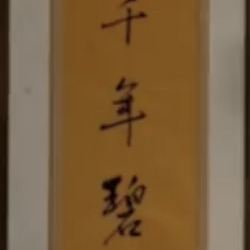
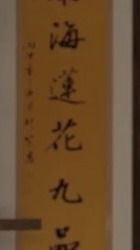
Originally hanging in right-to-left order, I've arranged them to read left to right here to make things easier to keep track of. The calligraphy reads 西方竹葉千年翠;南海蓮九品香 and is a couplet commonly found in Guanyin temples. My classical chinese is not as strong as I'd like, but this translates roughly to "The bamboo leaves in Paradise are green for a thousand years / The fragrance of lotus flowers in the South China Sea is as thick as 9 sticks of incense."
The character 西 for West is used to denote the destination of enlightenment/purity: the buddhist Paradise (think Journey to the West). The South China Sea is where Guanyin was born. Upon the Lotus flowers is where Guanyin is commonly depicted as sitting. The "9 sticks of incense" though literal can also refer to the 9 tiers/grades of reincarnation lotuses with the 9th tier being the lowest, meant for those who in life committed the most evil of crimes — the 4 parajikas — and who can only manage a sincere Amitabha recitation 10 times and no more than this.
To put this in context with Shen Jiu (the same jiu as in 9/九), the 4 parajikas committed by the 9th Tier Lotuses Reborn (officially entitled the Lowest of the Low) are:
Sexual Intercourse
Stealing
Murder
Claiming attainments of stages of pure mental concentration that have not been achieved (in other words, rushing or lying about your cultivation/enlightenment, or maybe even becoming a Peak Lord without having formed a golden core beforehand).
From what we know in the context of the novel, Shen Jiu is innocent of at least the first of this parajikas, but the overall view of Shen Jiu in the eyes of others in the story is that he is guilty of them all. This calligraphy can be seen as a condemnation or a reminder for the character Shen Jiu, who even as the Peak Lord Shen Qingqiu is widely thought of as a scum villain and the lowest of the low.
Phew! That's a lot to unpack.
But if you turn your gaze to the original screenshot, you'll see to the right that there's a vase painted with a blue bird. This vase appears in several rooms of the bamboo house, and seems to be the image of a qingniao (青鸟; lit: Qing bird, wherein 青 can mean blue/green/clear-but-brackish black).
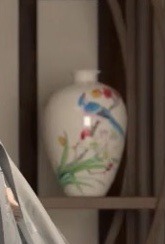
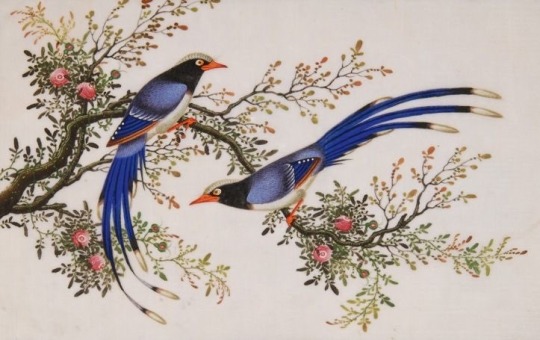
These qing-coloured birds are messengers and foragers of the Goddess-Mother of Paradise (Xiwang-mu 西王母, the "west/paradise" character from before, lit West-King(unisex)-Mother). They're a highly intelligent species who are exceptional in song (a good representative for Qing Jing's scholarly arts and pursuit of qin!), and the older ones might learn to speak human tongue. As a subspecies of luanniao (鸾鸟 lit: luan bird), they're thought to be related to The Phoenix and indeed thought to be the lifetime/samsara just before being reborn as a Phoenix.
If given to a "master" they don't like, the qingniao may refuse to pass messages or sing until they're set free, but if they do get along with you then they're loyal to the end.
As a point of interest, the Qing generation of Peak Lords uses the character 清, which is 青 ("colour of nature; brackish black, blue, green; young) + the radical for "water," resulting in the meaning of clear (as in water or heart; see-through); distinct; quiet (as in still); just and honest; pure; to settle or clear up; to clean up, expunge, or purge.
And as a bit of trivia, Liu Qingge's sword Cheng Luan 乘鸾 means "to ride the luan, take flight on the back of a luan." (Relevant, because the qingniao is considered a subspecies of luanniao).
With the Lords of both Qing Jing and Bai Zhan referencing this bird, I really wonder about its significance! It's spawning plenty of theories and headcanons for me.
Heading back outside for a moment, you'll find that in the Quiet Pool (清静小池 qingjing xiaochi (yes, the same Qing Jing the peak is named for)), there are lotuses, and on land there are flower shrubs which are either wide-petaled chrysanthemums (gay bottom jokes ahoy), or a type of peony, the king of flowers demarcating wealth and prosperity. Either way, a blossom fitting of our Qing Jing Peak Lord Shen Qingqiu!

My one regret is that I cannot get a clear shot of the fan hanging on the wall to try and translate the calligraphy on it. If anyone can snag one, please tag me! I also couldn't translate the paintings with poems hanging in Shen Qingqiu's bedroom (it's just too small and blurry for my bad eyes to make out). If I make another post attempting these things, I'll append them to this initial post in an edit afterwards.
#svsss#shen qingqiu#liu qingge#i started writing this at 3am#and now it's 8am#what am i doing with my life#who have i become#qing jing peak
498 notes
·
View notes
Text
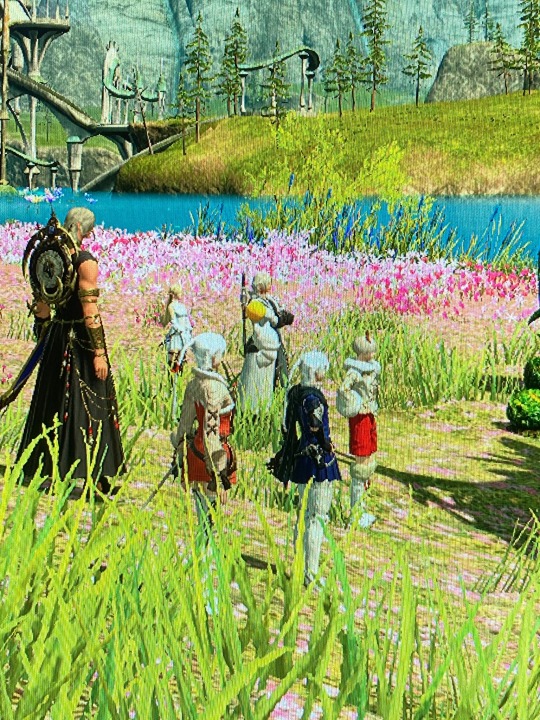
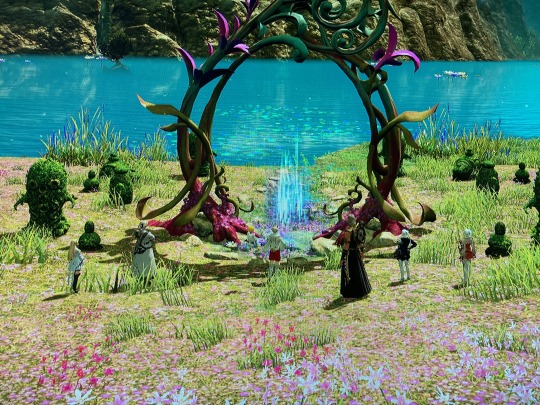
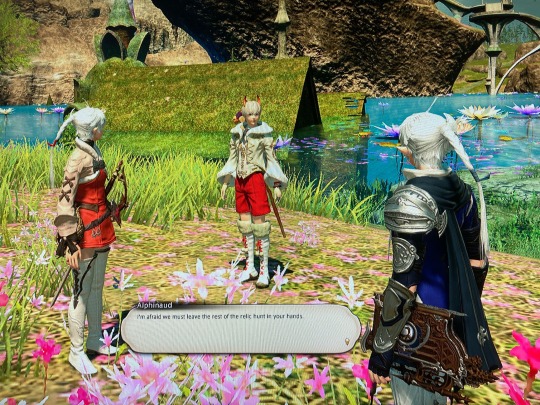
Oh god they're so small and itty-bitty
1 note
·
View note
Text
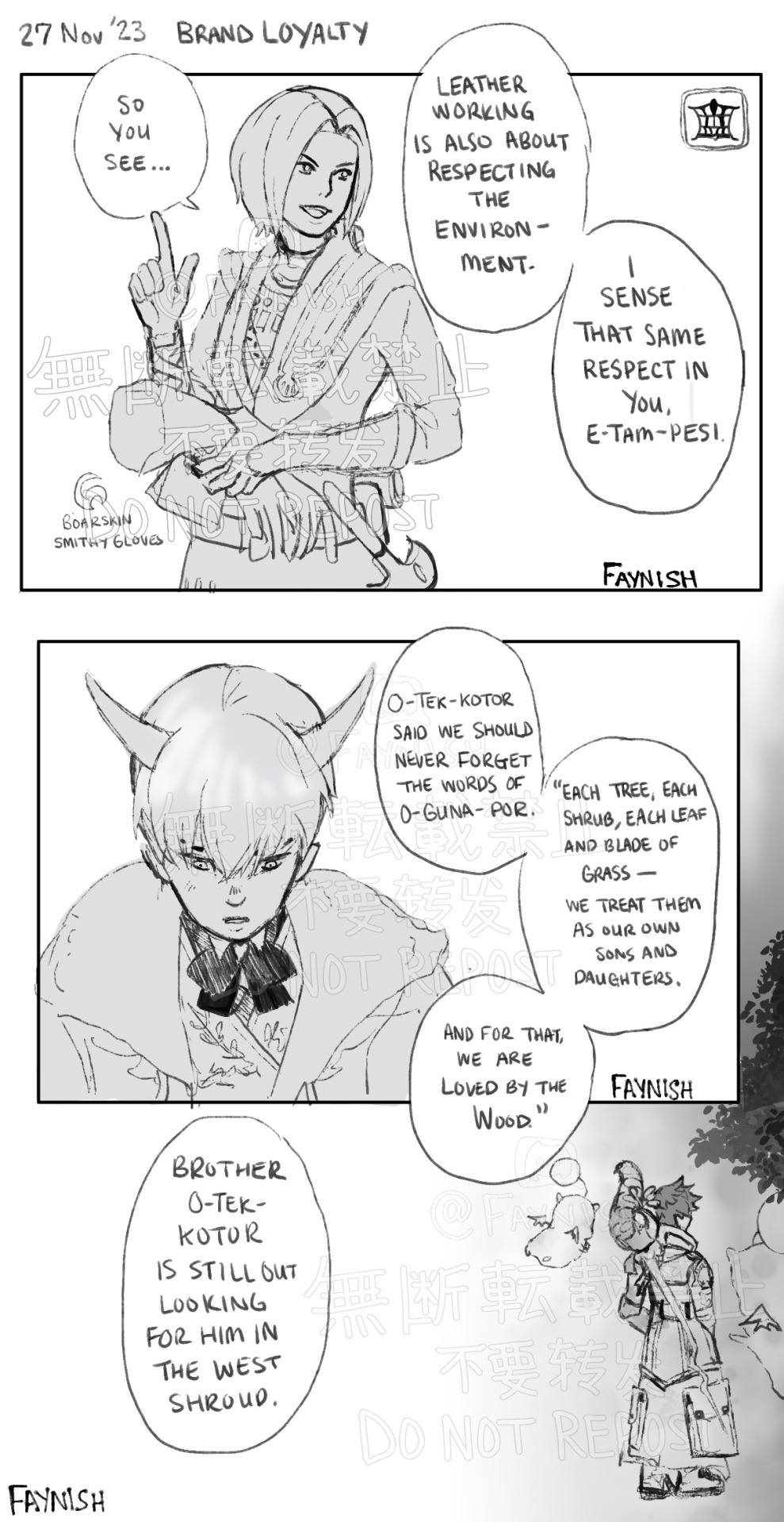
surprise, my other OC, o-tek-kotor (though he be abandoned), makes an appearance
#ffxiv#padjal#e-tam-pesi#o-tek-kotor#faynish's art#o-guna-por#but for real what happened to o-guna-por after 1.0?#i am convinced he's been purifying the West Shroud since the Calamity#i refuse to believe he's gone#and by gone i mean dead#but i cant even remember what he looks like anymore#o-guna-por come back
5 notes
·
View notes
Text
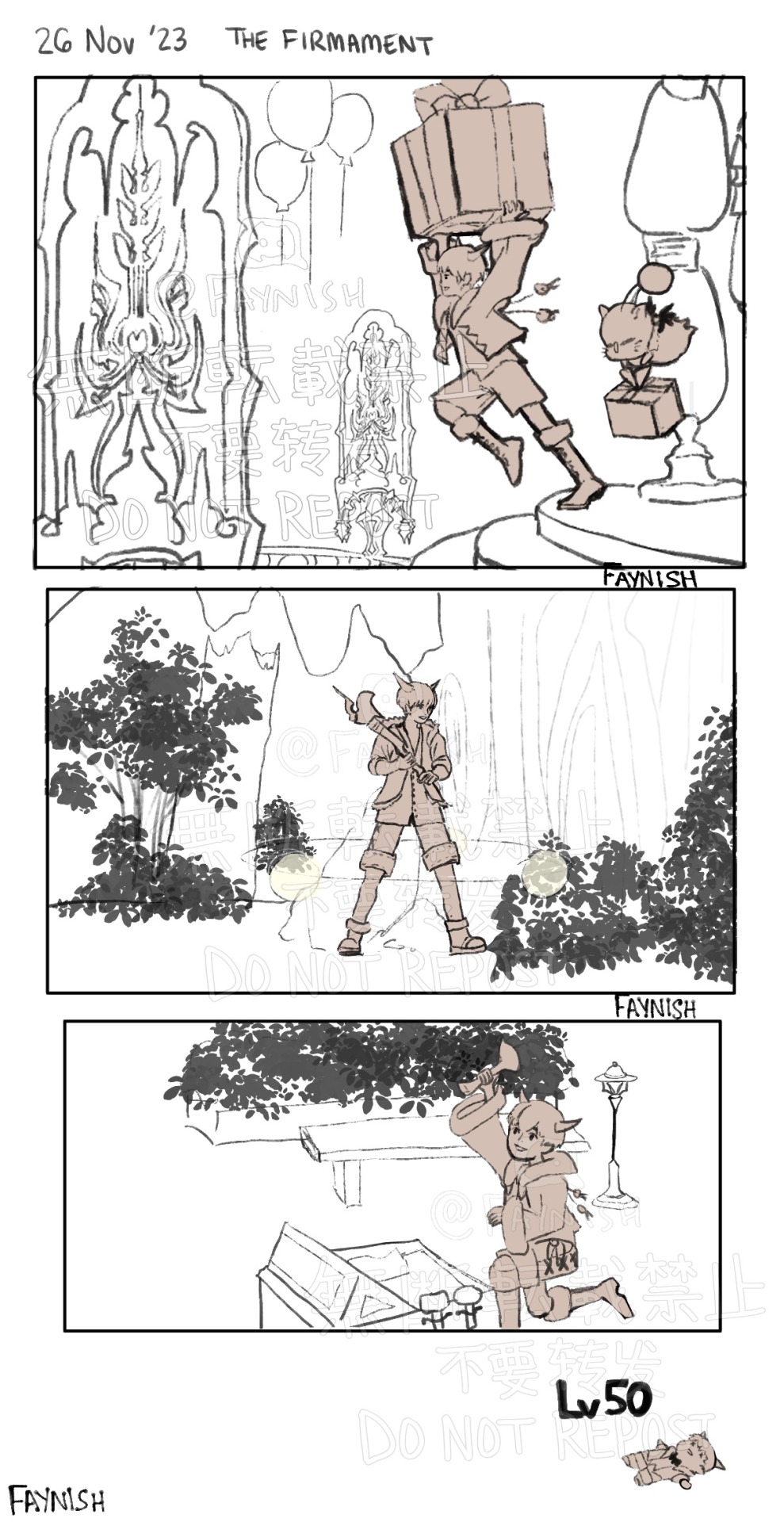
still not recovered
#ffxiv#the firmament#e-tam-pesi#padjal#faynish's art#tbh it's a lot of fun mindlessly crafting and gathering#and firmament makes it so quick#but i fear my inventory will never be the same
1 note
·
View note
Text
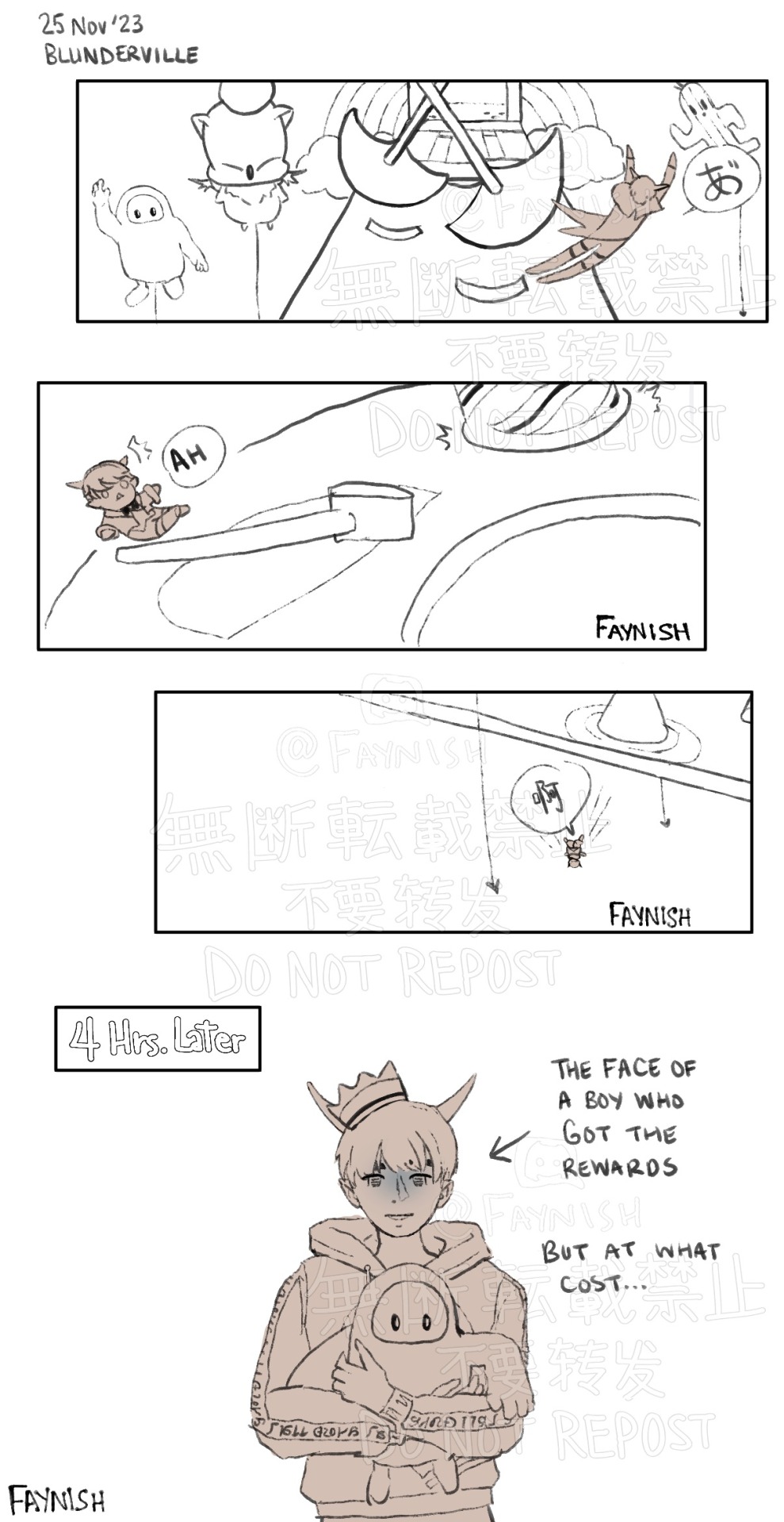
I thought I could recover this way. I was a fool.
#ffxiv#e-tam-pesi#padjal#blunderville#faynish's art#this is actually a really fun event#it was 4 hours very well spent#even if e-tam-pesi might not agree with me
3 notes
·
View notes
Text
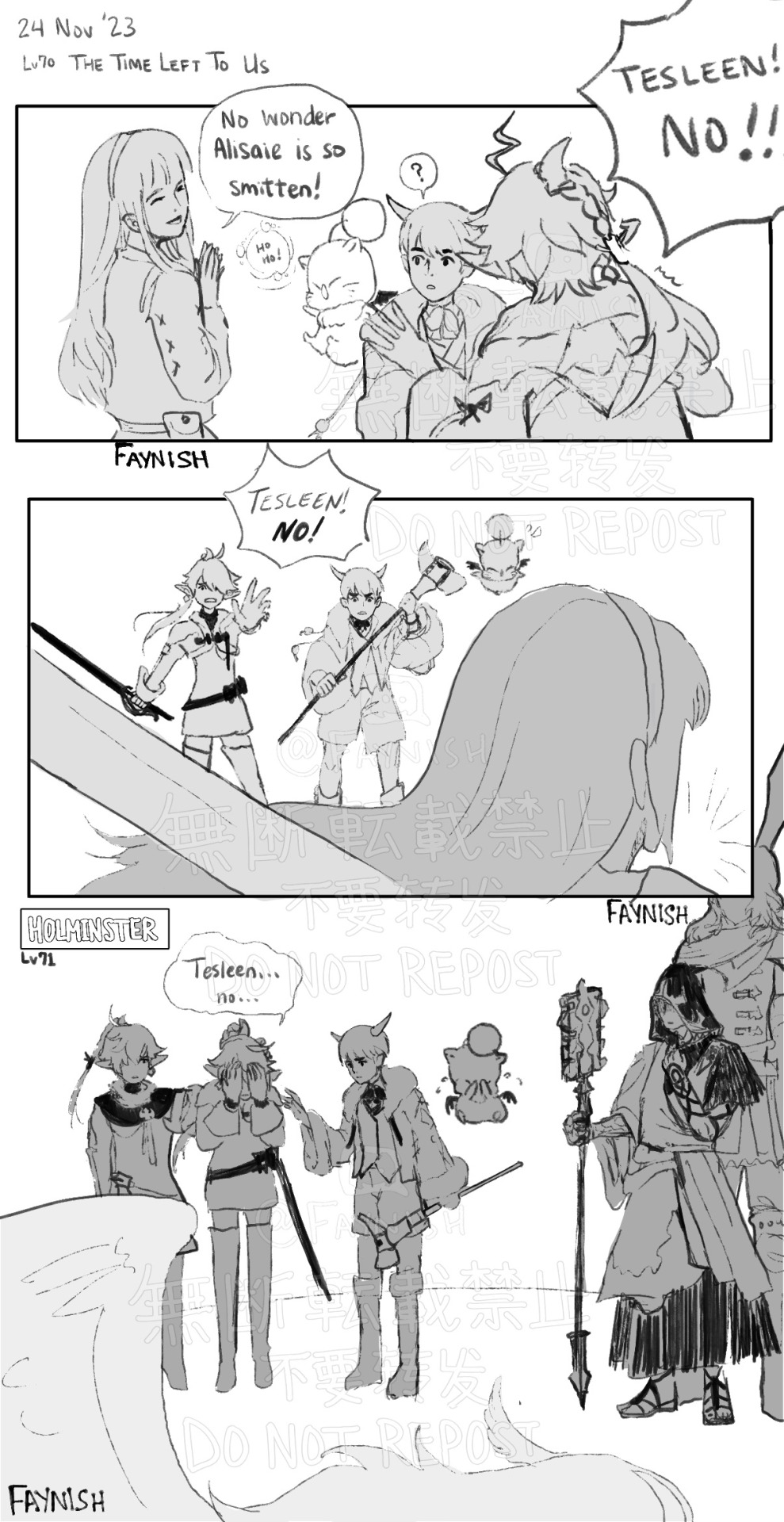
it was not a good time!!
#ffxiv#shadowbringers#e-tam-pesi#padjal#faynish's art#i haven't met a single Padjal on the First#since they're the only ones who are allowed to use white magic canonically#and they trace their history back to amdapor which is full of sin-eaters#do you think every Padjal on the First just became a greater sin eater immediately?#E-Tam-Pesi your pale colouring and horns have never looked more suspicious
13 notes
·
View notes
Text
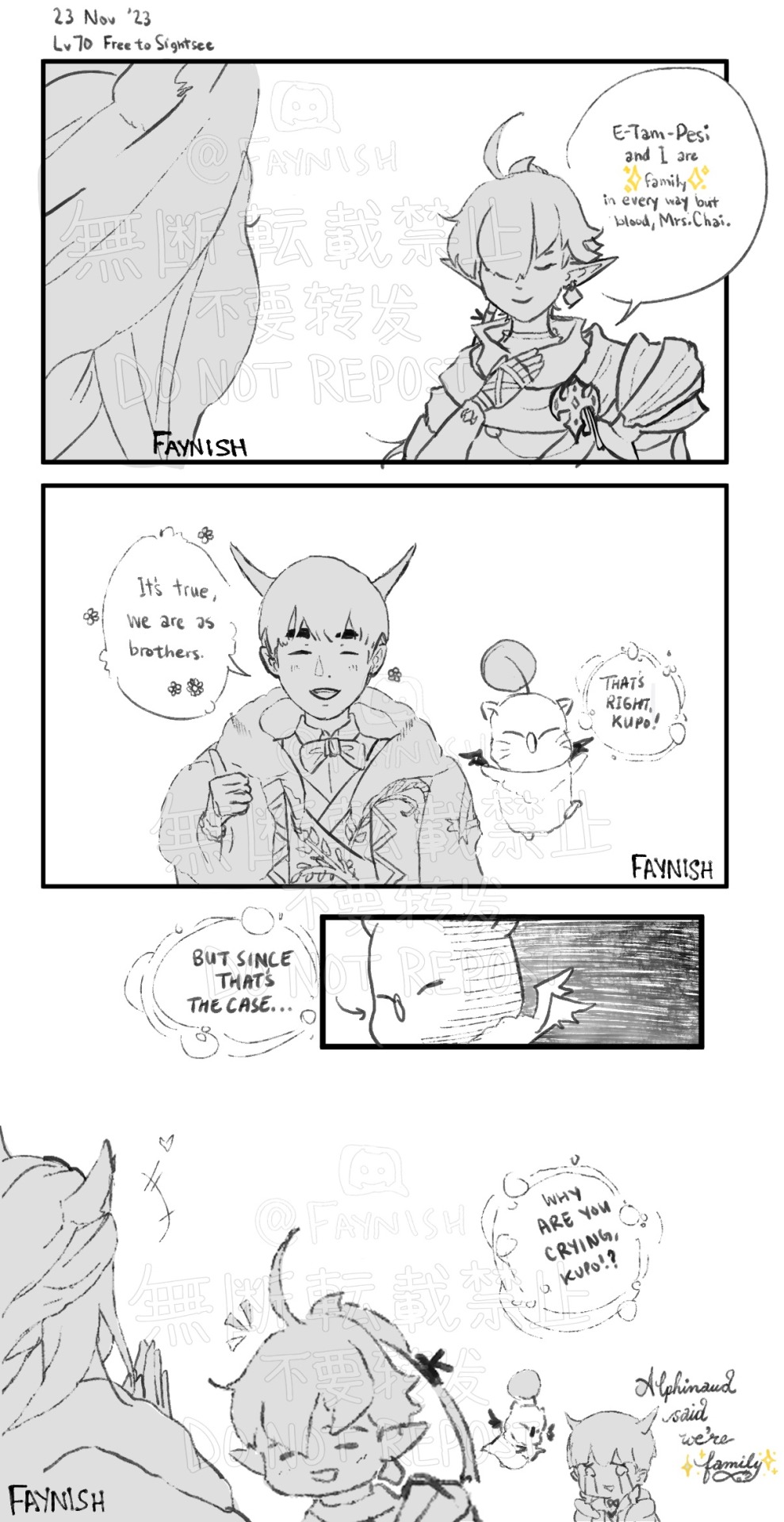
I started Shadowbringers on The Boy
#ffxiv#shadowbringers#e-tam-pesi#padjal#i haven't been able to play this game in two years#and i have missed it every day#to clarify#i have played through shadowbringers before#but technically not on e-tam-pesi#and also it's been 2 years#this is some backlog btw#i forgot to post until the week is almost over#faynish's art
6 notes
·
View notes
Note
Omg Hunxi! You’ve read SVSSS?! What did you think of it? What’s your opinion on Luo Binghe? It’s often looked down upon among the 3 novels, but I personally love it and it’s chaotic energy.
I mean, I've only read 2/3 of MXTX's novels, but I have a suspicion that SVSSS might be my favorite because the book is batshit insane and also so much fun
there's this manic energy to it that generates a heady mix of irreverence and intensity, slingshotting you from startled laughter to stunned silence and right back with the maximum amount of emotional whiplash possible
incidentally, this novel taught me more Chinese internet slang in <100 chapters than I've learned in my entire life
the best analogy I think I could make might be that... SVSSS kind of has the same energy as Bo Burnham's Inside? in that it is simultaneously a satire, a love letter, a deconstruction, and a reimagining of a genre (for Inside, Netflix comedy specials; for SVSSS, transmigration and stallion webnovels), while doing a really damn good job of its most direct purpose (being a rollicking good ride all the way down)
but sdlkfjsdlfkj Luo Binghe. oh man what a character
I feel like, no matter what long paragraphs or thematic complexity I can tease out of Luo Binghe and his characterization, his character arc and journey, no amount of words I write can beat @blackelement7's one-sentence summation of his character, which is: it's hard to be Luo Binghe
and really, much of SVSSS revolves around the deconstruction of narrative and character tropes--like, literally. (Shen Yuan as) Shen Qingqiu dismantles the ludicrously hackneyed and exaggerated plot of PIDW and accidentally puts it back together in a different shape just by, y'know, existing and being -- get ready for this -- a decent person
so Luo Binghe fits into this whole agenda by deconstructing a familiar archetype of the masculine, heroic protagonist--virile, undefeatable, hopelessly attractive, naturally talented, beloved of fate/happenstance/coincidence, unique and unlikely inheritor of multiple legacies, gifted with unrealistic sexual prowess. he has the tragic orphan origin story, the bitterly cruel and traumatic youth, then the vengeful return, the eventual violent triumph over those who had wronged him, his """happy""" ending of supreme power and supreme sexual satisfaction and supreme unbeatability
or at least, that's the original Luo Binghe
MXTX takes this larger-than-life legendary figure and shows us his hidden shadows, his deep insecurities, the flaws that have been expunged by the demands of readers and narrative (and oh boy does this book have things to say about the relationship between the author and the consumer). she takes the original Luo Binghe (and by extension, the entire stallion genre) gently by the hand and asks, have you found love?
I have a harem of hundreds of beautiful women, the original Luo Binghe replies.
have you found satisfaction? MXTX asks.
I rule the entire world, both human and demonic realms, he replies.
are you happy? MXTX asks, and cruelly, crucially--the original Luo Binghe cannot answer yes, and have that be true
MXTX takes every aspect of the original Luo Binghe and systematically subverts it: his virility is undercut by the fact that the person of his affections prefers Luo Binghe's younger, innocent self, not the virile, manly man that maidens ostensibly swoon over. Luo Binghe's undefeatability and ridiculous talents are undercut by the fact that no amount of strength, or power, or influence, will get him what he truly wants -- Shen Qingqiu's genuine love and affection. in the original PIDW, the goddamn trauma congo line that Luo Binghe gets put through only makes him stronger, laying the foundation of his eventual, triumphant, vengeful return. but in SVSSS, we see all the ways that Luo Binghe's trauma doesn't make him stronger -- in fact, leads him to incredible levels of insecurity and self-sabotage and self-hatred
or, in short:
PIDW: I've done it, I've crafted the perfect stallion novel protagonist
MXTX, busily typing: no you haven't, you've fucked up a perfectly nice young man is what you've done. look at him, he's got enough trauma to cause the apocalypse
a lot of our understanding of Luo Binghe is filtered through the lens of Shen Qingqiu, who is one of the most unreliable narrators I've ever had the privilege of laughing at. much of Shen Qingqiu's character arc in the novel is coming to realize that the people around him -- Luo Binghe, yes, but also Yue Qingyuan, Liu Qingge, all the women previously dismissed as love interests, and even, eventually, Shen Jiu -- are actually people too, not just flat fictional characters, but individuals with agendas and feelings and unwritten histories of their own. Shen Qingqiu is so preoccupied (and rightfully so!) with his fate and foreknowledge of the plot that he fails to notice for a comically long time that the plot has changed on him while he was busy jumping to conclusions about what certain people must be thinking
but back to Luo Binghe. the novel takes Luo Binghe's intense traumas and fears -- abandonment, self-loathing, rejection and very real hurt -- and makes them matter. past suffering doesn't just build character to make you stronger in the future -- you have to come to terms with it first, gain closure, let the wound heal over before you can safely build upon it. and despite having loyal subordinates, despite having more love interests than he can shake a evil sword at, Luo Binghe has no one to truly, emotionally support him
all those people flocking around him, all those women (allegedly) trying to sleep with him, and Luo Binghe doesn't have a single friend
the original PIDW would have you believe that's indicative of his strength and independence, his ability to stand alone. a Man (TM). MXTX takes one look at that and calls bullshit
or, in other words:
PIDW: I've done it, I've crafted the ultimate male fantasy
MXTX, typing faster: no you haven't, you've subscribed to toxic masculinity is what you've done. you created a lonely, overpowered young man who only knows how to deal with his problems through violence. look at him, he's got abandonment issues and unhealthy masochistic tendencies
(masochism is fine! but someone needs to gently pull Luo Binghe back into the realm of kink rather than deliberate self-harm, and while we're at it someone please give this man a hug without also detonating at the same time)
SVSSS takes the unrealistic, overperfected model of an archetypal male protagonist and shows us all the ways this person (and this model) is broken. the text constantly cracks jokes about 'the protagonist halo,' but for much of the book, Luo Binghe is never allowed to be a person--he is always The Protagonist, the half-demon spawn, the existential threat to the human cultivation world, and Luo Binghe’s continual dehumanization breaks him. and guess what? the eventual resolution of the conflict comes from nothing more and nothing less than Shen Qingqiu showing kindness. was it messy and fraught as hell? you fucking bet it was. but was the underlying message of the entire story also as simple as "but the villain needs love too!" you fucking bet it was.
this is a running theme in MXTX’s writing--we see it prominently in both SVSSS and TGCF: the colossal, literally world-saving power of empathy, and kindness, and love, and forgiveness, and that, I think, is crucial for understanding and appreciating Luo Binghe as a character
2K notes
·
View notes
